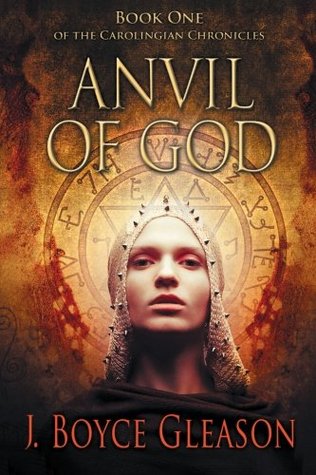
Summary:
It is 741. After subduing the pagan religions in the east, halting the march of Islam in the west, and conquering the continent for the Merovingian kings, mayor of the palace Charles the Hammer has one final ambition-the throne. Only one thing stands in his way-he is dying.
Charles cobbles together a plan to divide the kingdom among his three sons, betroth his daughter to a Lombard prince to secure his southern border, and keep the Church unified behind them through his friend Bishop Boniface. Despite his best efforts, the only thing to reign after Charles's death is chaos. His daughter has no intention of marrying anyone, let alone a Lombard prince. His two eldest sons question the rights of their younger pagan stepbrother, and the Church demands a steep price for their support. Son battles son, Christianity battles paganism, and Charles's daughter flees his court for an enemy's love.
Based on a true story, Anvil of God is a whirlwind of love, honor, sacrifice, and betrayal that follows a bereaved family's relentless quest for power and destiny.
Summary & Cover taken from Goodreads.com
Length: 440 pages (Paperback)
Source: Review Copy
Available Formats: Print/E-book
Publication Date: July 26th 2013 by iUniverse.com
I'd been wanting to read Anvil of God for a good while before I got the invite for this tour and I'd been hearing some pretty good things so obviously I had to sign up for it, and it's a good thing I did because it filled that niche of a book set in a time period I'm not all that familiar with.
I loved that the book was set in France in the 700s, which I don't see very often and thought it was a rare treat and enjoyed the author's take on the lives of Charles "The Hammer" and his children. Some things were very unfamiliar to me like certain references so Google played a good hand in helping me figure out what was what and while some may not like having to looking things up I relish it, because nothing beats a book that makes me curious.
The characters did take some getting used to I'll admit but that's because I ha to get used to the customs and the society of the time but I did come to like them all equally because they all brought something a little different to the story. I especially loved that Trudi, defied the image we hold of women of ages gone by a weak, waifish women more than happy to do what they must happily and naively. She was not like that at all and while I did have a couple issues with her personality I appreciated such a strong female character in a story dominated by men.
I enjoyed the fact that the book had a little bit of everything in it. There was murder, kidnap, corruption, war, betrayal, love, death and religion all mixed together and seeing the characters handle certain situations was great because everything was so interconnected with everything else that it was like a chess game which made for an intriguing read.
I thought it was reasonably paced even though it did slow down towards the middle for me but that was only for a chapter or two so other than that it flowed wonderfully, especially when it came to switching from character to character. Unlike other novels it didn't leave me feeling lost at "shift change" and I'm very, very much looking forward to reading the next book in the Carolingian Chronicles. I'd recommend this one to all historical fiction buffs who want a book set in a very unique period.
*I received a free copy of this book in exchange for my free and honest review. All thoughts and opinions expressed herein are 100% my own.
To purchase the book via Kobo CLICK HERE
To purchase the book via AmazonUK CLICK HERE
To purchase the book via Barnes & Noble CLICK HERE
Guest Post:
The Devil is in the Details
I was a reader of historical fiction long before I began to write it. And all too often, I found that authors are so enamored with creating the time period for their novel that they forget to tell the story. And if there is one thing I’ve learned about writing, it is to never let anything get in the way of a good story.
When I sat down to write Anvil of God, Book One of the Carolingian Chronicles, I promised myself that it would be a story about people first. I wanted the timeframe to be part of the environment that surrounds the story rather than the story itself.
That’s not to say there isn’t history in Anvil. Most of the story and the characters are based on actual people and events that took place in France and Germany during the year 741: Charles the Hammer dies and his death throws his family and the continent he conquered into chaos. Brother battles brother, Christianity battles Paganism and his young daughter must choose between her family and a love that lives halfway across the continent.
But while my story follows an accurate historical timeline, I focused my attention on discovering why it happens. How did they get to this place? What beliefs shape their emotions? Who do they love? What past events and experiences shape their lives? Are they reticent people or exuberant? Are they proud or humble? Rich or poor? Happy or sad? And most of all why are they?
Only after I had a good sense of who they are, did I weave in historical side notes. What clothes do they have to wear? How often do they bathe? How many miles a day do they walk? What do they do for entertainment? How do they get their news? What are their religious practices? Where do they go to the bathroom? What kind of weapons do they carry? How do they get their food? How do they cook it?
Do they know how to read? How does the time shape who they are?
What scars do they bear? In the eighth century there was little in the way of real medical care. Evidence from disease and trauma would be ever present. Warriors would be scarred. People’s teeth would be crooked, turning black, and falling out. A bad knee would stay bad.
It’s the details that provide a sense of timeframe.
One of the more troubling details is language. While there is great precedent for using Medieval language in historical fiction, (Forsooth, milady! Yon ragamuffin doth abscond with thy virtue!) I found no room for such in Anvil. I was careful to avoid modern language (such as zip, pedal, sandwich etc.) as these words hadn’t been invented by the eighth century, but other than that, I tried to focus more on conveying meaning rather than authenticity. Truth is, none of us would understand Early French of the eighth century.
Ultimately, you will have to be the judge of whether or not I succeeded.
Let me know what you think.
Author Bio:
 With an AB degree in history from Dartmouth College, Gleason brings a strong understanding of what events shaped the past and when, but writes historical-fiction to discover why. Gleason lives in Virginia with his wife Mary Margaret. They have three sons.
With an AB degree in history from Dartmouth College, Gleason brings a strong understanding of what events shaped the past and when, but writes historical-fiction to discover why. Gleason lives in Virginia with his wife Mary Margaret. They have three sons.Visit his website at www.jboycegleason.com.
Connect & Socialize!
TWITTER | FACEBOOK | GOODREADS









Wow looks great it's on my wishlist now!
ReplyDeleteOh, that sounds like a really fantastic :) France in the 700's is not a very well covered subject in most, if any books, that I read! Great review! Thanks for stopping by! Happy reading!
ReplyDelete